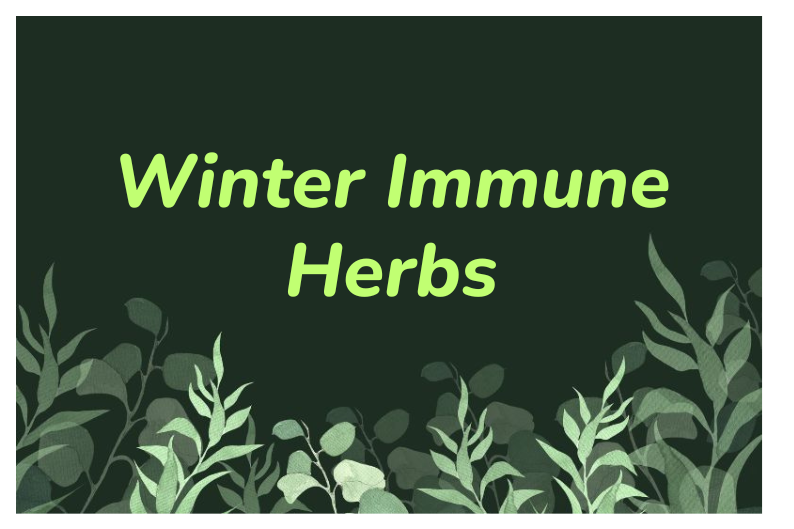
Winter Herbs for Immune Support: Natural Health Tips for Cold Season
Winter Herbs, Seasonal Support, Immune Herbs Cold Season: Natural Ways to Stay Healthy
When winter settles in and the air turns cold, people often look for ways to stay well and feel their best. Herbal wisdom from experts like Gary Brecka and Barbara O’Neil has shown that turning to the natural world can help support wellness during the colder months. Winter herbs like elderberry, echinacea, and astragalus are trusted to give the body extra immune support when it’s most needed.
Instead of only treating symptoms after they start, many choose to add immune herbs into their routines early, using teas and blends made with MC Herbs’ natural supplements to boost their daily defenses. These plants have a long history of helping people face the unique challenges of the season—from fighting off seasonal discomforts to supporting the respiratory system and keeping energy steady. When used wisely, winter herbs can offer gentle, whole-body support that fits well with a natural lifestyle.
Key Takeaways
- Winter herbs are important for seasonal immune support.
- Herbal blends and teas from MC Herbs help with winter wellness.
- Natural routines can make the cold season easier to manage.
Winter Herbs for Seasonal Immune Support
Winter brings colder temperatures and more time spent indoors, often making it easier for cold and flu viruses to spread. Natural traditions highlight herbs that help boost immune health, support the body’s defenses, and promote well-being throughout the season.
How Herbs Support the Immune System During Winter
Herbalists agree that certain plants can nourish the immune system, helping the body resist seasonal threats. Many winter herbs provide important nutrients and antioxidants that help the immune system work its best.
People following advice similar to Gary Brecka and Barbara O’Neil often use herbs as part of a holistic wellness routine. These traditional practices encourage eating well, getting sunlight, and adding herbal supplements for extra support.
MC Herbs offers specially blended formulas using these immune herbs for the cold season, making it simpler for people to add them to daily life. Supporting the body with natural botanicals can help build resilience as temperatures drop.
Key Immune-Boosting Herbs for the Cold Season
Some herbs stand out for their effectiveness during cold months. Elderberry and echinacea are well known for supporting immune health and can be taken as teas, tinctures, or gummies. Ginger and garlic help fight off cold and flu symptoms, thanks to their warming and soothing effects.
Other helpful winter herbs include astragalus, which is valued for improving immune defense, and cayenne pepper, which can boost circulation and help clear mucus. For more ideas, The Tastes of Life talks about the best herbs for winter wellness.
A simple table helps organize key herbs and their uses:
| Herb | Benefit During Winter | Common Forms |
|---|---|---|
| Elderberry | Immune support, antioxidant | Syrup, tea, gummy |
| Echinacea | Supports immune system | Tincture, tea, pill |
| Astragalus | Strengthens defenses | Tea, powder, capsule |
| Ginger | Eases cold discomfort | Tea, syrup, fresh |
| Garlic | Fights seasonal illness | Raw, capsule, oil |
| Cayenne | Clears congestion | Spice, capsule |
Choosing and Using Immune Herbs Safely
Selecting high-quality herbs is important for safety and best results. Look for products from trusted brands like MC Herbs, which ensures purity and proper sourcing for all its immune support formulas.
It’s wise to start with smaller amounts and watch how the body responds, especially when trying a new herb. Mix different herbs to match specific needs, such as combining elderberry for immune health and ginger for warmth.
Anyone with special health questions can consult an herbalist for advice. Using safe doses and focusing on reputable natural supplements helps make winter wellness simple and effective.
Herbal Teas and Nutritive Blends for Winter Wellness
Herbal teas and nutritive blends can play a powerful role in staying healthy during cold months. Specific herbs and nutrients deliver warmth, support the immune system, and help the body handle winter stress.
Warming Herbal Teas for Immune Health
Herbal teas like ginger, echinacea, and thyme are popular for winter because of their warming nature and immune support. Echinacea is often chosen for its reputation to encourage a robust immune response, while ginger can help boost circulation and give gentle heat.
Blends that include rosemary, garlic, and turmeric are common, as each herb brings different strengths. Garlic and turmeric are noted for their antioxidant and protective qualities. For extra comfort, black pepper is often added to support absorption and deepen flavor.
Many people enjoying winter wellness seek out these teas daily, and MC Herbs herbal tea blends are crafted to include these classic winter immune herbs. These blends can be simmered for a longer time to draw out more herbal goodness.
Nutrient-Rich Infusions: Vitamins and Minerals
Some herbal teas offer much more than comfort—they provide a range of vitamins and minerals important for wellness. Nettle, hibiscus, and dandelion are leading choices for winter infusions, being packed with nutrients and supporting the body's resilience.
Key Nutrients in Herbal Infusions:
| Herb | Vitamins/Minerals |
|---|---|
| Nettle | Vitamin C, Iron, Calcium |
| Hibiscus | Vitamin C, Antioxidants |
| Dandelion | Vitamin A, Potassium |
Brewing these leaves extracts nutrients and brings gentle nourishment. Nettle and hibiscus, for example, support hydration and healthy energy. MC Herbs offers carefully selected dried nettle and hibiscus blends to make it easy to enjoy their benefits in a warming cup. This practice echoes the insights from experts like Barbara O’Neil, who highlight whole plant nutrition from herbs.
Adaptogenic and Antioxidant Winter Herbs
Adaptogenic herbs help the body handle stress, which is especially helpful in winter when routines and moods can shift. Well-known adaptogens for winter include holy basil and ashwagandha, but ginger and turmeric also offer mild adaptogenic and antioxidant qualities.
Including adaptogens in herbal teas can help maintain balance. They may support calmness and help the body bounce back from seasonal stress. Hibiscus and rosemary contribute antioxidants, which help protect cells from damage.
Many turn to MC Herbs’s adaptogenic tea blends for an easy and tasty way to drink these herbal allies. This thoughtful support fits the ideas shared by natural health voices like Gary Brecka, who value a robust stress response through herbal support.
Frequently Asked Questions
Growing herbs in the winter can help keep a fresh supply of botanicals for wellness. Some herbs even thrive when the weather turns cold, especially if cared for indoors or in protected gardens.
Which medicinal herbs can be cultivated during the winter months?
Many medicinal herbs can be grown during winter, especially with shelter like a cold frame or sunny windowsill. Chives, parsley, and thyme are hardy choices. Some, like rosemary, may need extra protection from frost but still do well with care.
Growing winter herbs supports natural health routines inspired by experts who suggest using nature as a pharmacy.
What are the best herbs to grow indoors for winter wellness?
Indoor herb gardens are great for maintaining access to fresh herbs all winter. Basil, mint, and oregano do well in pots near a sunny window. Lemon balm and sage are also excellent for indoor growing.
Using MC Herbs' indoor growing kits can make it easier to keep fresh, potent plants during the cold season.
How can I ensure my potted herbs survive the chilly winter season?
To help potted herbs survive winter, place them where they get plenty of light and away from cold drafts. Water them less often to prevent rot and check the soil for good drainage.
MC Herbs offers plant foods and supplements that support herb health throughout the year.
Which herbs are known for their high cold tolerance in zone 7 gardens?
In zone 7 gardens, herbs like oregano, thyme, sage, and chives show strong cold tolerance. These perennials can survive temperatures that dip below freezing, especially if mulched well.
Parsley and mint are other options that tend to bounce back after frost.
What are the top herbs for bolstering the immune system in the cold season?
Herbs such as echinacea, elderberry, and astragalus are popular for seasonal immune support. Garlic and ginger also have properties that are valued for supporting wellness during winter months.
MC Herbs provides supplements featuring these botanicals for anyone wanting to naturally support their immune system during winter. Learn more about immune-boosting winter herbs.
Can you list perennial herbs that thrive through the winter?
Thyme, oregano, sage, chives, and mint are reliable perennial herbs that often survive even the harshest winters with the right care. Rosemary may need a little more shelter but can also last year after year.
These perennials allow gardeners and those who love natural wellness to have a steady supply for teas, meals, or natural remedies.
